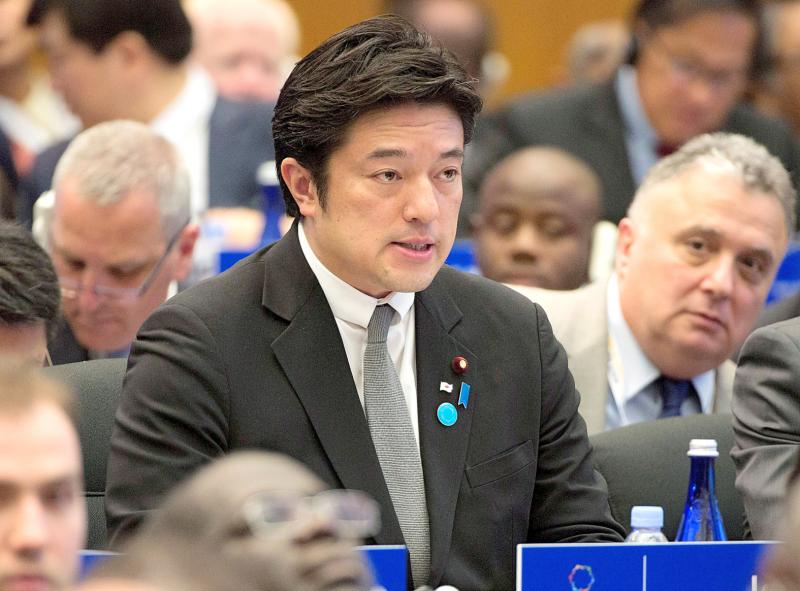Japanese State Minister of Defense Yasuhide Nakayama on Monday warned of a growing threat posed by Chinese and Russian collaboration, and said it was necessary to “wake up” to Beijing’s pressure on Taiwan and protect it “as a democratic country.”
Speaking to the Hudson Institute think tank, Nakayama questioned whether the decision of many countries, including Japan and US, to follow a “one China” policy that has recognized Beijing over Taipei since the 1970s would stand the test of time.
“Was it right?” he asked at the online event, referring to how future generations would judge policymakers on the issue. “I don’t know.”

Photo: Reuters
Democratic countries have to protect each other, he said, adding that he had in the past referred to Taiwan as a “red line.”
“So we have to protect Taiwan as a democratic country,” he said.
Japan and Taiwan are geographically close, and if something happened in Taiwan, it would affect Japan’s Okinawa Prefecture, where US forces and their families are based, he said.
“We are not friends of Taiwan, we are brothers,” he said.
Nakayama highlighted growing threats posed by China in space, in missile technology, in the cyberdomain, and in nuclear and conventional forces, and said that under Chinese President Xi Jinping’s (習近平) leadership, it had “aggressive, aggressive ... thought and will.”
“So wake up. We have to wake up,” he said.
Nakayama’s comments drew an angry response from Beijing, with Chinese Ministry of Foreign Affairs spokesman Wang Wenbin (汪文斌) saying: “We deplore the erroneous remarks by the senior official of the Japanese government, and we have lodged solemn representations.”
Nakayama had “falsely accused” China over “normal national defense developments,” he told a regular media briefing.
“This is highly sinister, dangerous and irresponsible. This politician also openly called Taiwan a country, in serious violation of the China-Japan joint statement,” he said.
“We urge the Japanese government to make a clarification and ensure this will not happen again,” he said.
Nakayama said it was necessary to show deterrence to China as well as Russia, which had stepped up exercises in Japanese-claimed territory and near Hawaii.
“You can see China and Russia collaborating together, when they are doing some military exercise around our neighbors,” Nakayama said, adding that he wanted to see the US “stronger, stronger and stronger.”
Additional reporting by Bloomberg

AIR SUPPORT: The Ministry of National Defense thanked the US for the delivery, adding that it was an indicator of the White House’s commitment to the Taiwan Relations Act Deputy Minister of National Defense Po Horng-huei (柏鴻輝) and Representative to the US Alexander Yui on Friday attended a delivery ceremony for the first of Taiwan’s long-awaited 66 F-16C/D Block 70 jets at a Lockheed Martin Corp factory in Greenville, South Carolina. “We are so proud to be the global home of the F-16 and to support Taiwan’s air defense capabilities,” US Representative William Timmons wrote on X, alongside a photograph of Taiwanese and US officials at the event. The F-16C/D Block 70 jets Taiwan ordered have the same capabilities as aircraft that had been upgraded to F-16Vs. The batch of Lockheed Martin

GRIDLOCK: The National Fire Agency’s Special Search and Rescue team is on standby to travel to the countries to help out with the rescue effort A powerful earthquake rocked Myanmar and neighboring Thailand yesterday, killing at least three people in Bangkok and burying dozens when a high-rise building under construction collapsed. Footage shared on social media from Myanmar’s second-largest city showed widespread destruction, raising fears that many were trapped under the rubble or killed. The magnitude 7.7 earthquake, with an epicenter near Mandalay in Myanmar, struck at midday and was followed by a strong magnitude 6.4 aftershock. The extent of death, injury and destruction — especially in Myanmar, which is embroiled in a civil war and where information is tightly controlled at the best of times —

China's military today said it began joint army, navy and rocket force exercises around Taiwan to "serve as a stern warning and powerful deterrent against Taiwanese independence," calling President William Lai (賴清德) a "parasite." The exercises come after Lai called Beijing a "foreign hostile force" last month. More than 10 Chinese military ships approached close to Taiwan's 24 nautical mile (44.4km) contiguous zone this morning and Taiwan sent its own warships to respond, two senior Taiwanese officials said. Taiwan has not yet detected any live fire by the Chinese military so far, one of the officials said. The drills took place after US Secretary

THUGGISH BEHAVIOR: Encouraging people to report independence supporters is another intimidation tactic that threatens cross-strait peace, the state department said China setting up an online system for reporting “Taiwanese independence” advocates is an “irresponsible and reprehensible” act, a US government spokesperson said on Friday. “China’s call for private individuals to report on alleged ‘persecution or suppression’ by supposed ‘Taiwan independence henchmen and accomplices’ is irresponsible and reprehensible,” an unnamed US Department of State spokesperson told the Central News Agency in an e-mail. The move is part of Beijing’s “intimidation campaign” against Taiwan and its supporters, and is “threatening free speech around the world, destabilizing the Indo-Pacific region, and deliberately eroding the cross-strait status quo,” the spokesperson said. The Chinese Communist Party’s “threats